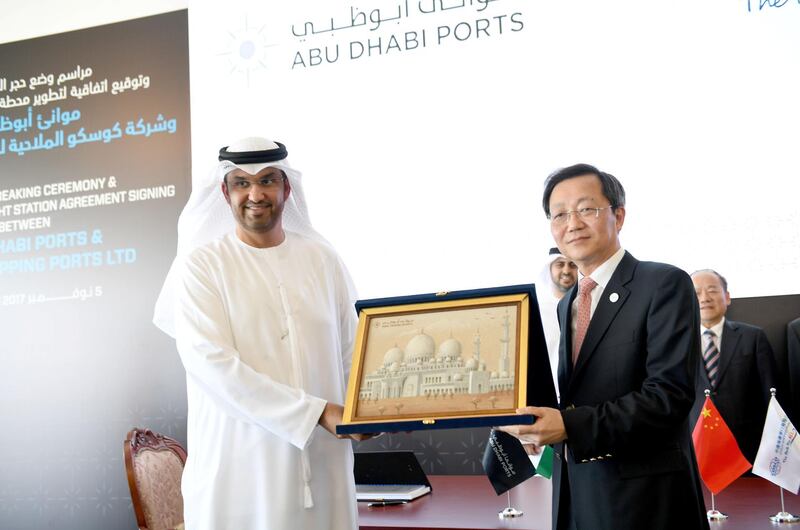Abu Dhabi Ports, which runs theUS$7 billion Khalifa Port, is courting Indian businesses to set up shop in its free trade zone, as it looks to capitalise on strong trade links with Asia's third-largest economy.
"We are targeting Indian manufacturers, importers, exporters and other Indian businessmen who want to consolidate their operations within the UAE to serve the GCC (and India, too from the GCC)," Mohamed Al Shamisi, chief executive of Abu Dhabi Ports, told The National.
"India is, and will continue to be, a big market and there are huge trade links between our two countries." Khalifa Port is celebrating its fifth anniversary today.
UAE-India bilateral trade for 2016 reached $50bn, including oil, and is projected to grow by around 6 per cent per year for the next two years. Abu Dhabi Ports, which concluded a roadshow to India last week, also plans another one to China this week to cement business relationships following a development deal with Jiangsu Province in the summer, Mr Al Shamisi said. The UAE ports operator signed a 50-year agreement with the Chinese Jiangsu Provincial Overseas Cooperation and Investment Company (JOCIC) in August, under which JOCIC will develop around 23.7 million square feet of Kizad's Khalifa Port Free Trade Zone for companies from Jiangsu Province. Kizad, an industrial park, is owned by Abu Dhabi Ports.
This deal, along with targeted influx of businesses from India, is expected to grow Kizad significantly over the coming years.
“We hit a big milestone for Kizad this year, leasing more than 3 square kilometres of space – one of the highest targets we have achieved since its inception, with 12 companies and around 50 per cent of space let. We are aiming to achieve the same amount of lettings in 2018, if not more,” Mr Al Shamisi said.
Three new factories are set to complete in Kizad next year, built by steel, food, and logistics companies that are establishing businesses at the port for the first time, he added.
“These companies will add value in terms of contribution to national GDP but also in terms of volumes handled throughout the facility,” he said.
________________________________
Read more:
[ Abu Dhabi Ports signs major agreement with Chinese to develop Kizad space ]
[ Abu Dhabi Ports, EGA sign dredging agreement to import bauxite ]
[ UAE-India bilateral trade to grow by 6% per year, says official ]
_________________________________
Looking ahead, Mr Al Shamisi said he was bullish, pointing to recent consolidations and alliances in the maritime industry.
“We believe there will be growth...both 2018 and 2019 will be promising years for Abu Dhabi Ports in terms of handling forecasts,” he said. Container volumes in 2019, are expected to double the 1.5 million twenty-foot equivalent units (TEUs) handled in 2017 once China’s Cosco Shipping Ports completes construction of its $700m container terminal at Khalifa Port. Cosco, which signed a 35-year concession agreement with Abu Dhabi Ports in 2016, broke ground on the terminal last month.
Last week, Abu Dhabi Ports entered a dredging agreement with Emirates Global Aluminium's (EGA) to allow the largest ‘Capesize’ dry cargo ships to berth fully laden at Khalifa Port, facilitating the import of bauxite to EGA’s Al Taweelah alumina refinery. The ports operator has plans to become one of the main deepwater ports in the Arabian Gulf.
Abu Dhabi Ports expects to sign a second ports concession agreement with a west African nation next year, Mr Al Shamisi said. It already operates a terminal in Guinea, where EGA is building a bauxite mine to import the raw material into the UAE to be used in aluminium production.





